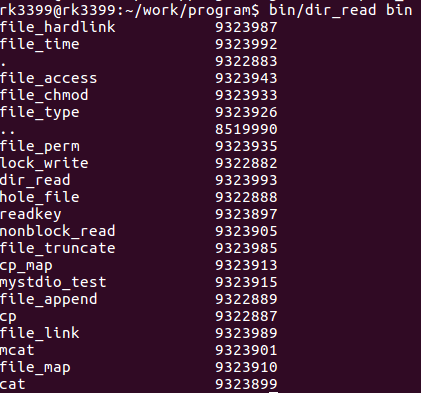15.1 目录操作函数
15.1.1 创建目录
1 #include <sys/types.h> 2 #include <sys/stat.h> 3 int mkdir(const char *pathname, mode_t mode)
- 函数说明:
- 该函数创建一个名为pathname的空目录,此目录自动含有 “.” 和 “..” 2 个登记项。这个新创建目录的用户 ID 被设置为调用进程的有效用户 ID,其组则为父目录的组 ID 或者进程的有效组 ID
- 若调用成功,mkdir 将更新该目录的 st_atime、st_ctime 和 st_mtime,同时更新其父目录的 st_ctime 和 st_mtime ,然后返回 0 。若调用失败,mkdir 将返回-1.
- 由 pathname指定的新目录的父目录必须存在,并且调用进程必须具有该父目录的写权限以及 pathname 涉及的各个分路径目录的搜寻权限
- 创建目录时,至少指定一个执行权限位
- 函数功能:创建目录
- 函数参数:
- @pathname : 新创建目录的目录名
- @mode:指定该目录的访问权限,这些位将受到文件创建方式(umask)的修正
- 返回值:成功返回0,失败返回 -1
15.1.2 删除目录
1 #include<unistd.h> 2 int rmdir(const char *pathname);
- 函数功能:
- 删除一个空目录
- 使用 rmdir 函数时候,目录必须为空或该目录的链接计数为2(只包含 . 和 ..),且无其他进程打开此目录,否则调用失败
- 返回值:
- 成功返回 0,失败返回 -1
15.1.3 打开目录
1 #include <sys/types.h> 2 #include <dirent.h> 3 DIR *opendir(const char *pathname);
- 函数功能:打开目录
- 返回值:成功返回目录指针,出错返回 NULL
15.1.4 读取目录
1 #include <sys/types.h> 2 #include <dirent.h> 3 struct dirent *readdir(DIR *dp);
- 函数功能:读取目录
- 返回值:成功返回指针,若在目录结尾或者出错,返回 NULL
15.1.5 重定位目录
1 #include <sys/types.h> 2 #include <dirent.h> 3 void rewinddir(dir(DIR *dp));
- 函数功能:重新定位从头开始读取
- 返回值:成功返回 0,出错返回 -1
15.1.6 关闭目录
1 #include <sys/types.h> 2 #include <dirent.h> 3 int closedir(DIR *dp)
- 函数功能:关闭目录
- 返回值:成功返回 0,出错返回 -1
15.1.7 dirent 结构体
1 struct dirent { 2 ino_t d_ino; /* i-node number */ 3 char d_name[NAME_MAX + 1]; /* null - terminated filename */ 4 }
15.1.8 指定新的当前工作目录
1 #include<unistd.h> 2 int chdir(const char *pathname); 3 int fchdir(int fd);
- 函数功能:分别用 pathname 或 fd 来指定新的当前工作目录
- 返回值:成功返回0,出错返回 -1
- 函数说明:当前工作目录是一个进程的属性,所以它只影响调用 chdir 的进程本身,而不影响其他进程
15.1.9 获得当前工作目录的绝对路径名
1 #include<unistd.h> 2 char *getcwd(char *buf, size_t size);
- 函数功能:获得当前工作目录的绝对路径名,getcwd()会将当前的工作目录绝对路径复制到参数buf所指的内存空间
- 返回值:成功返回 buff,出错返回 NULL
15.2 例子
15.2.1 读取一个目录
dir_read.c
1 #include <stdio.h> 2 #include <stdlib.h> 3 #include <dirent.h> 4 #include <string.h> 5 #include <sys/stat.h> 6 #include <errno.h> 7 8 int main(int argc, char *argv[]) 9 { 10 if(argc < 2) { 11 fprintf(stderr, "usage: %s dir\n", argv[0]); 12 exit(1); 13 } 14 15 struct stat buff; 16 if(lstat(argv[1], &buff) < 0) { 17 perror("lstat error"); 18 exit(1); 19 } 20 21 //判断是否是目录 22 if(!S_ISDIR(buff.st_mode)) { 23 fprintf(stderr, "%s is not a directory\n", argv[1]); 24 exit(1); 25 } 26 27 // 打开目录 28 DIR *dir = opendir(argv[1]); 29 if(dir == NULL) { 30 fprintf(stderr, "%s open error\n", argv[1]); 31 exit(1); 32 } 33 34 //读取目录内的信息 35 struct dirent *ent; 36 while((ent = readdir(dir)) != NULL) { 37 printf("%-20s %10ld\n", ent->d_name, ent->d_ino); 38 } 39 40 closedir(dir); 41 }
编译运行:

15.2.2 切换目录
mchdir.c
1 #include <stdio.h> 2 #include <stdlib.h> 3 #include <unistd.h> 4 #include <fcntl.h> 5 #include <string.h> 6 #include <memory.h> 7 8 int main(int argc, char *argv[]) 9 { 10 if(argc < 2) { 11 fprintf(stderr, "usage: %s\n", argv[0]); 12 exit(1); 13 } 14 15 char buff[4096]; 16 memset(buff, 0, sizeof(buff)); 17 //获得当前工作目录 18 if(getcwd(buff, sizeof(buff)) != NULL) { 19 printf("current dir: %s\n", buff); 20 } 21 22 //切换目录 23 if(chdir(argv[1]) < 0) { 24 perror("chdir error"); 25 exit(1); 26 } 27 28 memset(buff, 0, sizeof(buff)); 29 if(getcwd(buff, sizeof(buff)) != NULL) { 30 printf("current dir: %s\n", buff); 31 } 32 33 return 0; 34 }
编译运行:
